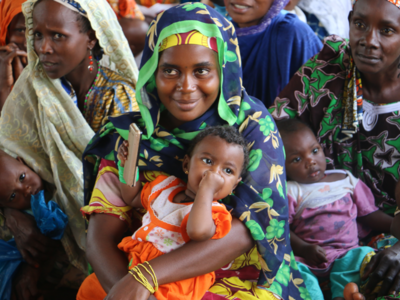Cameroon
- 3.4 million
- people in need of humanitarian assistance
- 29%
- children under 5 are stunted (impaired development due to malnutrition)
- 28.6 million
- population
Cameroon is a lower-middle-income country, ranking 151st out of 193 countries in the 2023/2024 Human Development Index.
Poverty levels have remained high due to weak economic growth against a faster population growth, combined with the rising cost of living.
Over 23 percent of Cameroonians live below the international poverty line (US$2.15 per person per day), and extreme poverty could reach 25 percent by 2026 – affecting 8 million people. Rates are particularly high in rural parts of the northern regions, where structural underdevelopment and recurring climatic shocks, including floods and prolonged dry spells, limit people’s ability to thrive.
Three crises have led to over 1 million people being internally displaced and 436,000 becoming refugees: armed conflicts between non-state armed groups (NSAGs) and state security forces in the Northwest and the Southwest regions; the insurgency of NSAGs, as well as climate-related disasters in the Far North Region; and an influx of Central African Republic refugees in the Adamawa, East and North regions.
WFP operations focus on crisis response, resilience building and mitigating the root causes of food insecurity.
What the World Food Programme is doing in Cameroon
-
Emergency response
-
WFP provides unconditional life-saving food assistance to populations affected by shocks such as violent conflict and the effects of climate change and pandemics, including refugees, internally displaced persons (IDPs), returnees and vulnerable host communities in Adamawa, East, Far North, North, North West and South West regions. WFP’s support ensures safe access to adequate and nutritious food during and after crises, while supporting recovery from and building resilience to shocks.
-
Early recovery and resilience
-
WFP promotes the creation of productive assets and supports the development of income-generating activities using community-led gender-responsive approaches. WFP works to ensure that vulnerable families in protracted displacement and at-risk communities in chronically food-insecure areas have safe year-round access to adequate and nutritious food and increase their resilience to shocks.
-
Addressing malnutrition
-
WFP provides nutrition assistance to children aged 6 months to 5 years, pregnant and breastfeeding women and girls, and malnourished people living with HIV. WFP’s goal is to reduce all forms of malnutrition among the target vulnerable populations in prioritized food insecure regions in line with national priorities. WFP’s nutrition improvement activities include malnutrition prevention and treatment, social and behaviour change communication to encourage the adoption of recommended nutritional practices as well as capacity strengthening. These are, implemented in coordination with government, other UN agencies and nutrition partners.
-
Support to smallholder farmers
-
WFP provides financial and technical support to food insecure smallholder farmers in the Far North, North, Adamawa and East regions of Cameroon to enhance their productivity and livelihoods. WFP’s focus is on promoting local agricultural value chains among smallholder farmers through building and managing community infrastructure and post-harvest storage facilities, improving agricultural practices, diversifying crop production, and enhancing market access for both men and women.
-
Capacity strengthening
-
WFP supports the Government in developing shock-response, gender- and nutrition-sensitive social safety nets and creating national systems for cash transfers as well as for home-grown school meals. Support to the Government includes South-South cooperation initiatives facilitated by WFP’s Centres of Excellence in Brazil and China.
-
UN Humanitarian Air Service (UNHAS)
-
WFP operates safe, reliable, and cost-effective air services to enable the humanitarian community to reach people in need in hard-to-reach crisis-affected areas. By operating passenger and cargo aircraft, including security and medical evaluations, WFP provides alternative transport where commercial air operators are unavailable due to significant distances and insecurity limiting access to parts of the country. WFP is committed to strengthening air transport service delivery by reopening and launching additional destinations throughout the pandemic and post-pandemic period.
Cameroon news releases
Go to pagePartners and donors
Find out more about the state of food security in Cameroon
Visit the food security analysis pageOperations in Cameroon
Contacts
Office
P.O. Box 7308, Rue Giscard, Estaing, Face Cercle Municipal
Yaoundé
Cameroon







